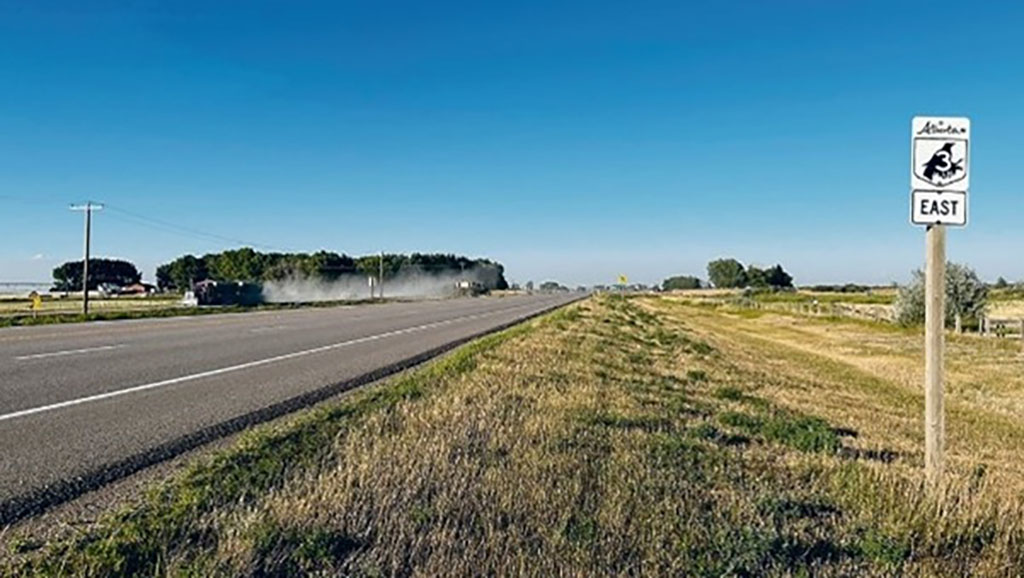Ledcor Highways Ltd. is leading off work on the first of eight phases planned to twin Alberta’s Highway 3 which is expected to take up to 10 years and cost $2 billion to complete over the 323 kilometre corridor linking B.C. to Saskatchewan and intercepting Highways 2 and 1.
The $179.7 million first phase involves the twinning of 46-kilometres between the Town of Taber and Hamlet of Burdett and is the longest leg of the upgrade.
“Highway 3 is becoming a big problem,” said Bill Chapman, vice-president of the Highway 3 Twinning Development Association, which represents towns along the route that have been pushing for an upgrade for two decades.
The southern Alberta area, he said, is the agricultural capital of Canada with millions of new investment dollars pouring into the region.
“Safety is the number one issue,” he said, “but the movement of goods and services, the tourism industry, and transportation are all key components of why we want it twinned.”
The new dollar investments in the southeastern area include McCain’s $600 million expansion of its Coaldale potato processing plant in late 2023, doubling the employee base to 485. In 2019 Irving invested $360 million in a new Lethbridge potato processing plant.
Netherlands-based NewCold is currently building a $222-million cold food storage facility in Coaldale, creating more than 50 permanent jobs. A $77 million Agri-Food Hub and Trade Centre in Lethbridge opened in 2023.
The highway also connects with Highway 2 west of Fort Macleod which leads to Calgary, where GoodLeaf Farms opened what’s being called the largest vertical farm in Canada, a $52 million facility, while the Alberta government has green-lighted Green Impact Partners $1.2 billion negative-emissions renewable natural bio-energy plant in the southeast outskirts of Calgary.
Ledcor has started construction on Highway 3 which will separate oncoming traffic by building new eastbound lanes adjacent to the current highway on the Taber to Burdett stretch.It will also include the construction of an eight-kilometre, four-lane divided highway bypassing the Hamlet of Grassy Lake. The project will also include 11 bridges, additional auxiliary lanes, intersection improvements, rest pullouts and a service road. The expected completion date is 2026.
Ledcor, on its website, said the project will involve nearly three million cubic metres of grading work, laying one million tonnes of granular base materials and 475,000 tonnes of asphalt concrete pavement using one of two new lower emission asphalt plants.
“The new plants introduced technology that eliminated direct contact between the flame and the asphalt oil, reducing greenhouse gas emissions. The new, more environmentally friendly, containment system collects airborne dust and particulate from the exhaust to prevent it from being emitted. The new system also removes the requirement for water use by recycling the particles back into the asphalt,” it said.
Chapman said the twinning will involve some realignment or bypasses of various towns. In the past it was common to route major highways through towns.
“In the l980s, travelling Calgary to Winnipeg one-way on the TransCanada was 16 hours,” he said, but with new road design and bypasses the trip is now 12 hours.
In the early 2000s, passing lanes were constructed on Highway 3 to accommodate truck and farm equipment, but the traffic volumes have surpassed any efficiency.
Chapman said there are still details affecting towns that are being considered on the other seven phases.
But engineering and planning is being carried out in order to acquire the needed land as agricultural land prices have escalated, he said. There is no information on what phase will follow the first-leg completion.
The other phases are:
- East of Burdett to west of Seven Persons (30 kilometres): A functional planning study has been completed; the province continues to consult with the Town of Bow Island and other stakeholders to finalize the alignment. The proposed bypass is being revisited to accommodate an interchange to the town plus an alignment closer to the downtown which could yield cost and farmland savings.
- West of Seven Persons to Medicine Hat (36 kilometres): Planning studies have been completed, the engineering contract has been awarded and design work is underway. The design engineer is AECOM with ISL as a sub-consultant. An airport runway bypass has been requested by the City of Medicine Hat and Cypress County. Location of the roadway at Seven Persons will be reviewed to evaluate the impact on land however the alignment as it relates to the interchange is expected to remain the same.
- Highway 3X/Coleman Bypass (14 kilometres): Planning studies have been completed, and engineering completed. Design work will begin in mid-2024.
- Blairmore to east of Highway 22 (21 kilometres): Planning studies are complete and engineering planned for fall 2024.
- East of Highway 22 to east of Highway 6 at Pincher Creek (20 kilometres): Planning studies are complete and engineering starting in winter 2024.
- Pincher Creek to west of Fort Macleod (38 kilometres): A functional planning study through the Piikani First Nation Reserve is underway.
- Alberta/B.C. border to Highway 3X. Alignments with improvements are being planned with B.C.




Recent Comments